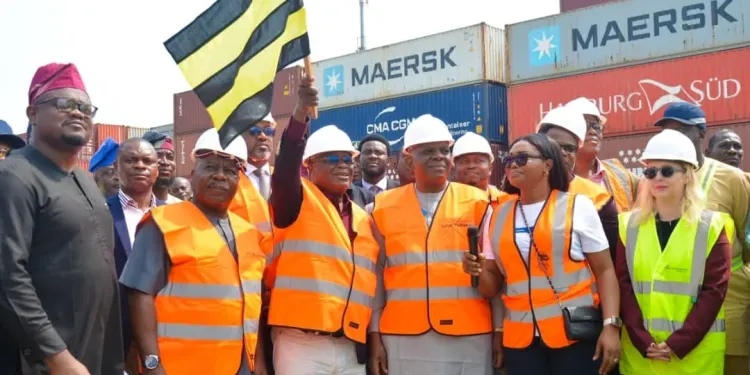The Nigerian Railway Corporation (NRC), has formalized its partnership with the APM Terminals, to expand cargo movement from the Apapa Port in Lagos to NRC’s freight yard in Moniya, Ibadan, Oyo State.
At the flag-off ceremony of the standard gauge rail yesterday in Apapa, Lagos, the new Managing Director of the NRC, Dr Kayode Opeifa, pledged that his agency will fully support the imitiative.
According to him, the collaboration aims to enhance logistics efficiency, increase rail transport capacity, offer a more sustainable, cost-effective solution for cargo movement, and decongest the Apapa port.
The train will travel three times weekly- Mondays, Wednesdays, and Fridays, with each train trip carrying 35 wagons of 35 by 40ft or 35 wagons of 70 by 20ft containers or a mixture of both sizes.
Opeifa said, “I am delighted to officially welcome you to the flag-off of container movement from Apapa to Moniya in Ibadan on the standard gauge rail. Though NRC and APM Terminals have a long history of doing business with container traffic to places in the hinterland of Nigeria such as Kaduna and Kano, it is mainly on the narrow gauge lines.
“However, container traffic movement by rail on the standard gauge in and out of APM Terminals to Moniya freight yard in Ibadan commenced on September 2023 with the likes of Bueno Logistics and Transco Africa Logistics blazing the trail among other customers using the single ‘transitional line’ in APMT.
“Two additional lines are at an advanced stage of completion in APMT which will bring the total lines within the APMT standard gauge corridor to three lines.”
Executive Secretary/CEO of the Nigerian Shippers Council (NSC), Dr Pius Akutah said, “We at the NSC understand that rail transport happens to be the cheapest and safest when it comes to trade. Recall that this time last year, the NSC and the NRC signed a Memorandum of Understanding to look into the possibility of developing a rail transport system to support trade.”
He commended President Tinubu for providing necessary support towards the development of infrastructure that supports trade facilitation.













